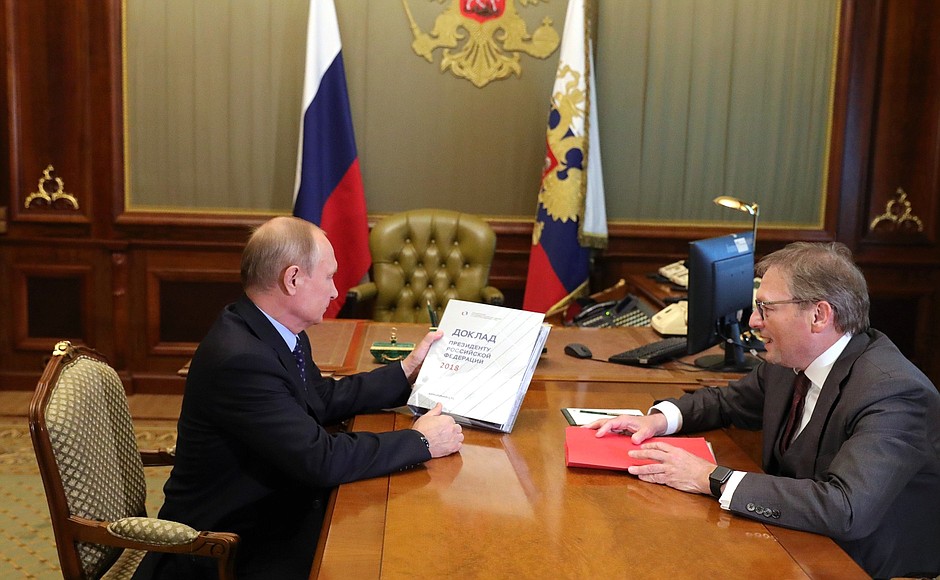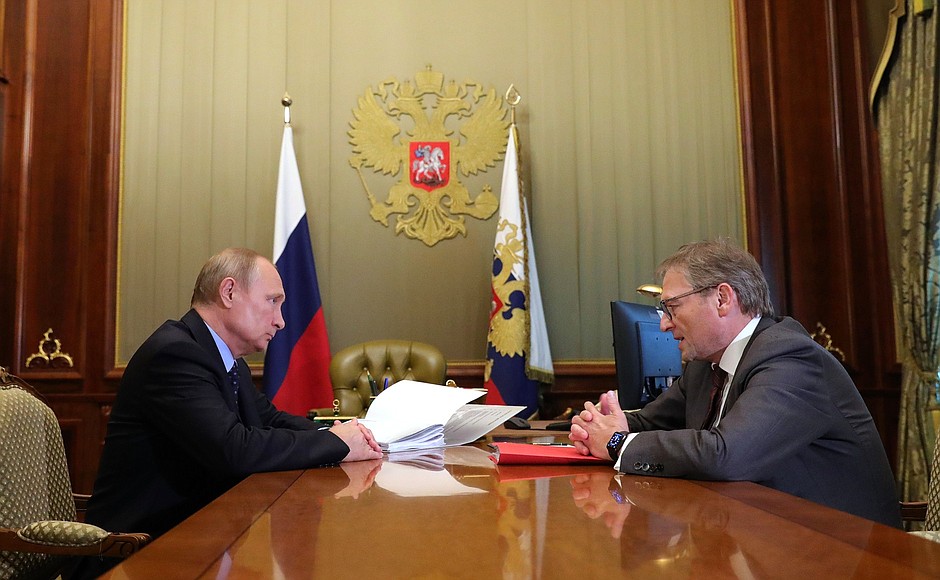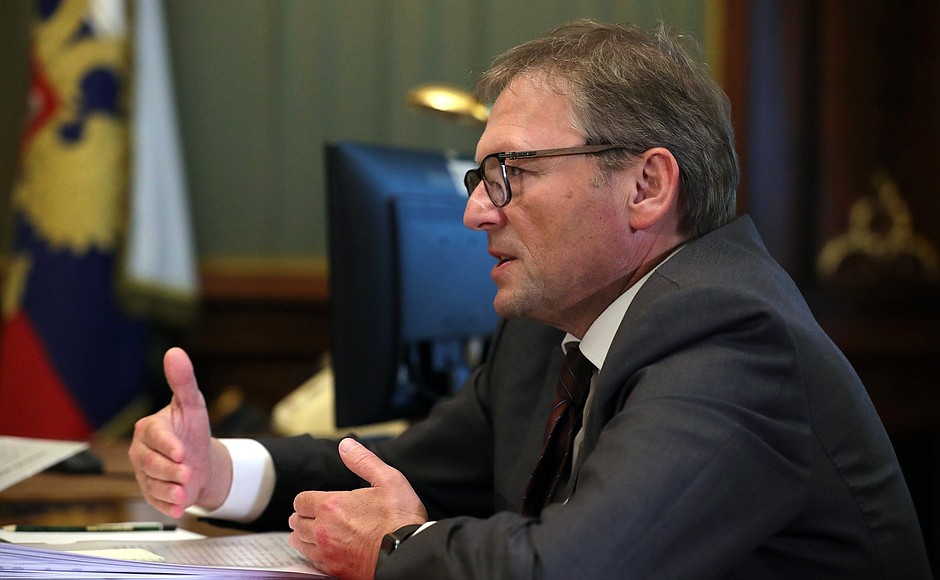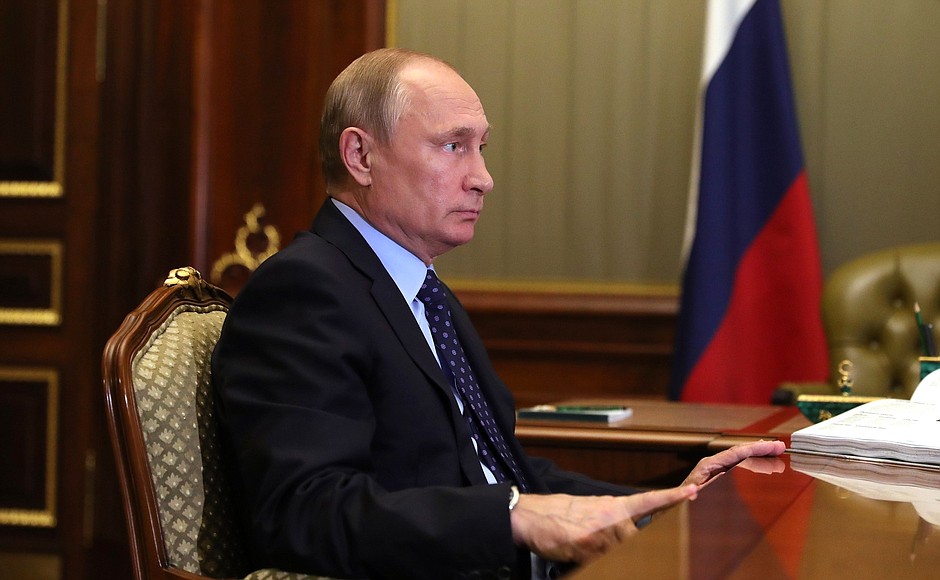President of Russia Vladimir Putin: Mr Titov, you have the annual report.
Presidential Commissioner for Entrepreneurs' Rights Boris Titov: Yes, Mr President, this is the fifth annual report. I would like to present it.
I must say that, like previous ones, it is based on the appeals that we receive. Over the past year, the number of appeals has increased by almost 23 percent.
In addition, we hold meetings with the business community. There were over 80 meetings and situational analyses in the regions. And in Moscow we held 34 meetings on various issues.
In addition, we carry out sociological research. Of course, the general conclusion to date is that the situation remains difficult. There are positive changes, for example, the growth in criminal prosecutions has slightly slowed down today, but we still cannot say that the problem has been solved.
In addition, there is also administrative pressure on businesses. Unfortunately, businesses are still feeling this and are rather negative about this and about these trends. More than 80 percent said that administrative pressure remains high.
But there is also positive change: for example, according to our studies, businesses are positive about the fact that corruption is going down and transparency of government procedures is getting better.
However, at the same time, I must say that there are also other problems, and they are connected primarily with the economic conditions of doing business today.
Vladimir Putin: Just a second. We have already discussed some of these issues and even formulated the task of amending existing laws. In fact, the task of amending current legislation was assigned based on your suggestions. What is going on there? How far along are solutions to these issues? Do you remember what we discussed and how this was formulated?
Boris Titov: As for criminal prosecutions, amendments were made to damage thresholds on which the penalty for certain violations or crimes depends. In this sense, the situation has improved. Of course, there are fewer cases of punishment, because damage thresholds went up.
Unfortunately, Article 159 remains an issue. As you know, it is the “loosest” article in the code, since it accounts for 80 percent of charges brought against businesses in Russia.
Vladimir Putin: This is so, but we were also discussing other matters of a purely procedural nature, such as detention and so on.
Boris Titov: There were amendments to Article 108 of the Criminal Procedure Code whereby entrepreneurs are not to be subjected to pre-trial restrictions involving arrest or deprivation of liberty. Unfortunately, we see that this is not working so far, although the number of entrepreneurs in pre-trial detention has actually dropped by almost 5,000.
Vladimir Putin: What about the extension of the time limit of the investigation? Sometimes the time limit is extended indefinitely.
Boris Titov: This is still happening. For example, there was a case when entrepreneurs spent three years in prison before the trial begun. We hope that now the proceedings will take less time.
It is unfortunate that there are no limits in this field so far.
As you said at a meeting in Amur Region, our procedural rights should be expanded in terms of our involvement in court proceedings to defend entrepreneurs, and I am referring to both civil law courts and criminal courts. I made legislative proposals to this effect.
Vladimir Putin: But you are referring to specific cases rather than a limited number of individuals.
Boris Titov: Yes, my proposals refer to entrepreneurs who are members of business associations and unions.
Vladimir Putin: You also mention specific cases.
Boris Titov: Yes, this is correct.
Vladimir Putin: We have talked about the need to introduce limits regarding extensions that are sometimes endless. What do you have to say on this matter?
Boris Titov: We made our proposals, but they have not been accepted yet, Mr President. Our first proposal was to have any subsequent decision to extend pre-trial restrictions to be made by a court of a higher jurisdiction, but so far this is not the case.
In addition, we proposed that judges who rule on pre-trial restrictions cannot preside over the trial, separating these two functions. This used to be the case just a few years ago, but this proposal has yet to be taken up as well.
Vladimir Putin: We need to understand whether this requirement is reasonable.
As for endless extensions, I think that we need to go back. I sought advice from the President of the Supreme Court and the Prosecutor General before supporting your proposal. The heads of the main agencies in charge of citizen rights largely agree with you. So let us get back to this approach.
Boris Titov: Yes, definitely. Thank you very much, Mr President. After all, we made our proposals, but unfortunately, they have yet to find their way into legislation.
Vladimir Putin: I would ask you to come back to this and formulate your proposal again, and work on this, would you?
Boris Titov: Yes, of course.
As I have said, the issues certainly have to do with the current economic situation, because the growth that we see today in the Russian economy does not yet cover all sectors. It is primarily less pronounced in manufacturing. Therefore, many business leaders are not yet aware of a new stage beginning in the development of Russia’s economy. As many as 70 percent said they felt as if they were still in 2014, because the negative economic changes that occurred in 2014 are not completely gone yet.
At the same time, I would like to say that we are also doing a big job here. We have compiled two special reports, which I would like to submit to you. This year’s reports cover the most pressing problems that entrepreneurs are concerned about. The first deals with natural monopolies’ rates, mainly electricity, and the second – with fire safety.
Regarding electricity rates, we are doing a lot of analytical work on how the rates are set – whether this is done in compliance with the law or not. I can say that the first conclusions we made after analysing nine pilot regions, were that we did expose violations – an almost 28 percent overvaluation of the grid component alone.
Vladimir Putin: Do the regional commissions make such decisions?
Boris Titov: Regional commissions, plus the generating companies’ markups. I would like to ask you, if possible, to issue instructions to the Prosecutor General's Office. We have already started working with them and have very effective interaction. We have analysed state contracts and payments and practically eliminated government debt to businesses for the work performed. It also is necessary to streamline rates in the same way.
Vladimir Putin: Fine.
Boris Titov: Thank you.
As for fire safety, we have to admit that the situation is grave. Many businesspeople are responsible for this, but the regulating authorities are liable as well, because we see that the fire safety requirements for different facilities are not quite clear, are not comprehensive, meaning that they can be increased or otherwise adjusted depending on the situation. In addition, these requirements are not imposed by a single regulatory agency but by a host of such agencies.
Therefore, we would like to suggest, if possible, switching over to an obligatory fire safety declaration for the most hazardous facilities that attract large numbers of people. This used to be voluntary. In other words, requirements for such facilities must be detailed and exhaustive, signed by a regulatory authority and binding for the owner. The good part is that there will be no new requirements and no amendments to the approved list.
If all sides, that is, the government and businesses, accepted such requirements today, at least for the fire hazard facilities, this would greatly improve our fire safety.
Vladimir Putin: I agree with you. The recent tragedies have shown that much is still to be done to restore order in this sphere. Of course, it would be wise to draft the guidelines you have mentioned, which must be clear, transparent and effective. But given the rapid development of technology, these guidelines must also be flexible and subject to revision. This is my first point here. I agree with you on this.
My second point is that we must certainly pay more attention to the fire service. It would be reasonable to think about increasing the number of personnel, or at least bringing it up to the previously proposed standards. We must also provide new technology. This is a comprehensive task. Please, formulate your proposals, and we will work on them together.
<…>



